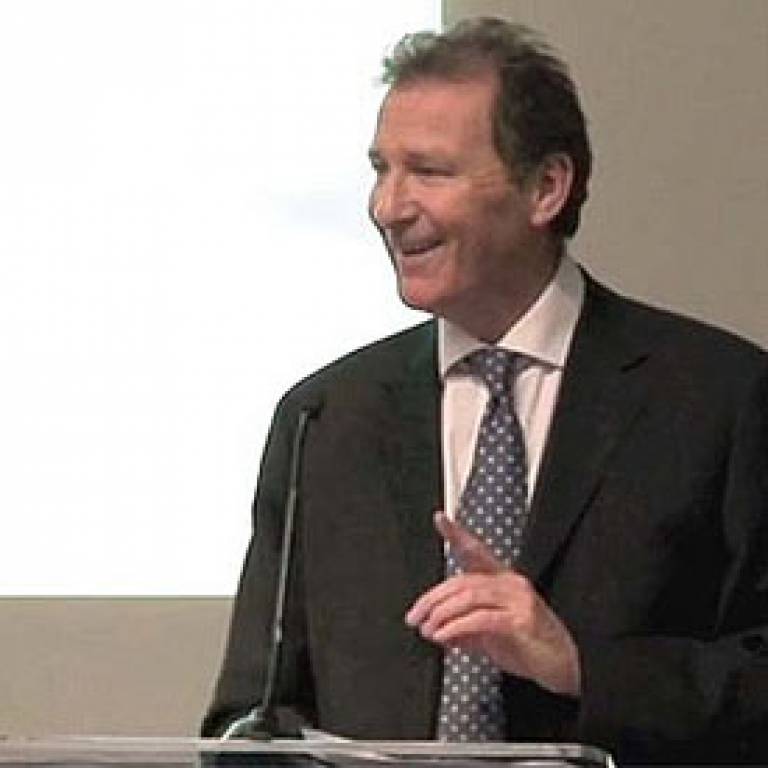Sir Gus O'Donnell seminar on the Cabinet Manual
3 March 2011
Link:
 ucl.ac.uk/constitution-unit/events/public-seminars/201011/cabinet-manual" target="_self">UCL Constitution Unit site: full transcript, photographs and blog comments
ucl.ac.uk/constitution-unit/events/public-seminars/201011/cabinet-manual" target="_self">UCL Constitution Unit site: full transcript, photographs and blog comments
"More than just a Janet and John guide
to the Queen and stuff" was how Cabinet Secretary Sir Gus O'Donnell, Britain's most senior civil
servant, described the Cabinet Manual, the subject of one of the UCL Constitution Unit's Public Seminars on 24 February.
Patrick Graham, a Constitution Unit intern, summarises the presentation and discussion below.
"Cabinet Secretary Sir Gus O'Donnell, Britain's most senior civil
servant, delivered a presentation on the proposed Cabinet Manual on Thursday 24
February. This was part of the Constitution Unit's Public Seminar Series and
was held at the Institute for Government.
Published by the Cabinet Office, a draft version of the Manual is currently
being considered by three parliamentary Select Committees while a consultation
period is scheduled to end on 8 March. Sir Gus explained that the Manual is intended to 'help
the public better understand how our democracy works' by making the inner
workings of government more transparent. He emphasised, however, that it is not
intended to be an exhaustive description of existing practices: rather, the
Manual should act as a 'high-level summary' of areas such as ministerial
responsibility, devolution and hung parliaments.
Watch the lecture in full by clicking on the player below
Sir Gus also took time to address some criticisms that have been directed at
the Cabinet Manual as well as some myths that surround it. It is not, he
stated, a written constitution with a defined legal status, nor is it intended
to direct the administration of government. It is a statement of how the
executive functions and one that is written in an understandable manner: no
Erskine May or Magna Carta but a 'work of reference that guides those of us
who work in or with government, and opens up how government works so that it
can be better understood by people across the country'.
In February 2010 the skeleton structure of the Manual as well as a draft chapter on elections and government formation were published. This draft was to take practical effect after the May 2010 general election. Sir Gus argued that the Manual served as a 'useful, modest piece of guidance' during the political negotiations which immediately followed.
Furthermore he rejected criticisms that publication of the draft chapter had unduly influenced those negotiations: whether that was by dictating the speed at which negotiations between the Conservatives and Liberal Democrats should take place or for how long Prime Minister Gordon Brown should stay in office.
Sir Gus contended that the most fundamental conclusion to be drawn from those 'five days in May' is that the civil service was fully able to meet the challenge presented by this "unusual situation."
Sir Gus concluded his presentation by reiterating that the Cabinet Manual should not be understood as a seminal constitutional document but, nevertheless, should act as more than, in the words of Lord Powell, 'a bit of a Janet and John guide to the Queen and so on'.
During the question and answer session that followed, Sir Gus was asked to comment on the Manual's proposed longevity, the role of the sovereign and the relationship between the executive and judiciary. Particularly salient in the mind of the Cabinet Secretary and those involved in the Manual was the tricky problem of revision: what should be acknowledged as now-existing practice, and when should this acknowledgement take place? This issue may come back to haunt Sir Gus and his successors."
Image: Sir Gus O'Donnell courtesy of the Constitution Unit on Flickr.
UCL context
The Constitution Unit was founded by Robert
Hazell in 1995. It is an independent
think tank and research centre which specialises in constitutional reform. Its main focus has been constitutional reform
in the UK, and its close collaborators include policymakers in Westminster, Whitehall and elsewhere. To learn lessons from experience overseas,
much of its research is comparative.
 Close
Close

